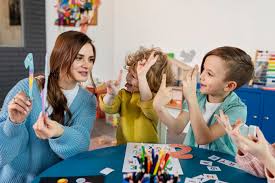Teaching Emotional Regulation Skills To Toddlers

Emotions are an integral part of human experience, even for the tiniest among us. Toddlers, in particular are often overwhelmed by the intensity of their feelings and lack the tools to manage them effectively. Teaching emotional regulation skills to toddlers is important for their social and emotional development, setting the foundation for healthier relationships and coping strategies later in life.
What is Emotional Regulation?
Emotional regulation refers to the ability to manage and express emotions in appropriate ways. For toddlers, this means learning to recognize and name their feelings, understand the triggers behind them, and develop coping strategies to navigate through them.
Why Teach Emotional Regulation Skills to Toddlers?
- Because it Promotes Self-Awareness: Teaching toddlers about emotions helps them become more aware of their own feelings and reactions.
- It Enhances Social Skills: Emotional regulation lays the groundwork for healthy social interactions, as toddlers learn to understand and empathize with other’s emotions.
- It Reduces Behavioral Issues: By learning to regulate their emotions, toddlers are less likely to engage in disruptive or aggressive behaviors.
- It Also Builds Resilience: Developing emotional regulation skills equips toddlers with the resilience needed to conquer the ups and downs of life more effectively.
Strategies for Teaching Emotional Regulation Skills
- Labeling Emotions: Help toddlers identify and name their emotions by using simple language. For example, “I see you’re feeling frustrated because you can’t find your toy.”
- Model Healthy Expression: Model healthy ways of expressing and managing emotions in front of your toddler. Let them see you take deep breaths when you’re feeling angry or use calming techniques when you’re upset.
- Practice Empathy: Encourage empathy by talking about how others might be feeling in different situations. For example, “How do you think your friend feels when you share your toys with them?”
- Create a Calm Down Corner: Designate a quiet area where toddlers can go to calm down when they’re feeling overwhelmed or upset. Stock it with comfort items like stuffed animals or books.
- Teach Coping Strategies: Teach toddlers age-appropriate coping strategies such as deep breathing, counting to ten, or hugging a stuffed animal when they’re upset.
- Use Visual Aids: Use visual aids such as emotion charts or feeling faces to help toddlers recognize and express their emotions.
- Encourage Positive Reinforcement: Praise toddlers when they successfully identify and manage their emotions. Positive reinforcement encourages them to continue practicing these skills.
- Be Patient and Supportive: Remember that learning emotional regulation takes time and practice. Be patient with your toddler and offer support and encouragement along the way.
Adding Emotional Regulation Skills Into Daily Life
- Routine Check-Ins: Do regular check-ins throughout the day to ask your toddler how they’re feeling. This helps them practice identifying and communicating their emotions.
- Story Time: Read books about emotions and emotional regulation to your toddler. Use the stories as a springboard for discussions about different feelings and coping strategies.
- Role-Playing: Engage in pretend play scenarios that involve different emotions and problem solving skills. This allows toddlers to practice regulating their emotions in a safe and supportive environment.
- Family Meetings: Hold family meetings where everyone can discuss their emotions and brainstorm solutions to any challenges or conflicts that arise.
- Stay Calm During Meltdowns: When toddlers experience meltdowns, stay calm and offer reassurance. Validate their feelings while gently guiding them toward calming strategies.
SEE ALSO:
Using Visual Aids For Behavior Management
Toddler Friendly Activities Near Me: The Benefits Of Outdoor Play For Toddlers
10 Effective Toddler Communication Strategies
Recognizing And Addressing Toddler Fears And Anxieties
Teaching Conflict Resolution To Toddlers
Takeaway
Teaching emotional regulation skills to toddlers is a valuable investment in their future well being. By providing them with the tools and support they need to take care of their emotions, we empower them to live happier, healthier lives. Through patience, consistency, and positive reinforcement, we can help our little ones become more resilient, empathetic, and emotionally intelligent individuals.
Leave a Reply